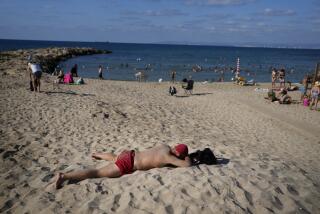Oases in Israel : Relaxing at three comfort zones in the harsh desert
- Share via
This, many an Israeli will tell you, isn’t the real Israel. It’s too new, too comfortable. In spirit and in geography, Eilat can seem far removed from the struggles that have defined Jerusalem, Gaza and the disputed territories at the northern end of the country.
But Eilat, Israel’s southern toehold on the Red Sea, is almost certainly the country’s comfort capital. Israelis and foreigners come in roughly equal numbers for its resort hotels, its beachfront promenade, its top-notch diving and snorkeling. And on Eilat’s inland side, they can find more familiar Israeli scenery: the red, beige and gray expanses of the Negev Desert, dotted by the occasional kibbutz.
For an American on a demanding Middle East itinerary, Eilat can be the perfect place to take a breather. I landed there last fall, just after a week of haggling and camel-riding in Cairo and the Sinai, just before another week of desert hikes and ruins-touring in Petra and Amman, Jordan. In Eilat, my adventures were more modest and began with a little wandering along King’s Wharf, a double-scoop cone from the Ben & Jerry’s, a beer on a patio at dusk.
True, Eilat is not everyone’s idea of a place to relax. In one of this century’s most violence-ridden regions, the resort city sits in Israel’s loneliest corner with the Egyptian border on one side, the Jordanian border on the other. All told, Eilat (also spelled Elat) has less than 10 miles of beachfront. Beyond the breakers of its beaches, you can just make out the undeveloped coast of Saudi Arabia, a long, low colorless lump across the Red Sea. To fully relax anywhere in the Middle East, a degree of faith is required. But on any day in any season, Eilat is full of people in a state of obvious and profound relaxation.
The day of my arrival, I took a $5 taxi ride over to Coral World Eilat, the underwater observatory, a futuristic structure that sticks up from the shallow water at Coral Beach. Nearby, in the waters of the Coral Beach Nature Reserve, scuba divers and snorkelers bob and splash. Elsewhere along the waterfront, tourists commune with dolphins, race in jet skis, float beneath para-sails.
Choosing to stay dry this day, I paid my $18 admission, descended the stairs and stood at a window 20 feet below the Red Sea’s surface, ogling fish of 1,000 hues. Some were confined to aquarium containers and dramatically lighted, like new products on sale. Sharks circled in round tanks. Still other fish drifted in the open sea, visible through picture windows that reminded me of California’s Monterey Bay Aquarium.
But there are at least two big differences between aquarium life in California and aquarium life in Eilat. One is that the Red Sea’s native fishes are far more colorful than those of the California coast. The other difference is that while most tourism in California is a secular--if not downright godless--pursuit, many travelers in Israel have spiritual matters in mind. This made for intriguing eavesdropping at the aquarium windows.
“And idiots think of evolution!” said one man in a stage whisper to his wife as they watched a slow procession of yellow and orange fish through a blue aquarium window. “These are the wonders of God’s creation!”
“Dear,” said another woman to her mate, “I’ve just had a thought. Here we are looking at all these fish, and yet Moses parted the Red Sea. They must have started right up again.”
*
I stayed at the Isrotel King Solomon’s Palace, one of several tall hotels in the city’s Northern Beach area. The hotel was a big but agreeable place with a popular poolside area, and one night I walked from there to a novel buffet dinner at the nearby Isrotel Royal Beach Hotel’s Vista Restaurant: Diners were invited into the kitchen, and set free to claim our buffet options from that world of stainless steel and working cooks. Having selected our food, we returned to the dining room, where a saxophone player strolled table to table.
But the Eilat hotel that made me most envious was the Orchid, which lies near the aquarium above Coral Beach on Ha-Arava Road.
The Orchid Hotel and Resort looks from a distance like a misplaced Swiss chalet. Up close, however, I realized that it is instead a misplaced Thai palace.
“At long last,” begins the brochure, “Israel has a Thai-style resort village of its own.” But in a locale that features a “Texas Ranch” theme park (at which camel rides are offered), a Yellow Submarine sea-viewing excursion, a Club Med and a restaurant that calls itself The Bedouin Tent but offers kosher food, one can’t be too fussy about cultural dissonance.
And the Orchid is a wonderful little oasis. Exotic sculpture and craft works stand here and there in dramatic light, the wooden floors gleam beneath rattan furniture, wide windows and an airy A-frame design. The palm-shaded, stonework-lined pool area is inviting and becalming. And no, the Orchid wasn’t cheap--double rooms usually fetch $135 to $200 per night,-- but it was less costly than many of the taller, larger resort hotels on the water.
(Since my visit, the Dan Eilat hotel has been completed and has joined the Isrotel Royal Beach and the Eilat Princess among the leading luxury lodgings in the city. At the more affordable end of the price spectrum, there are several older, smaller lodgings in the central city area, which lies on a hillside northwest of the beaches.)
*
Though the city’s first beach-area hotel went up in the late 1950s, Eilat’s emergence as a resort came after the 1967 Six-Day War between Israel and Egypt, which left the Sinai under Israeli control. Three decades later, the Sinai belongs to Egypt, and Eilat is the end of Israel. But instead of dwindling, tourism has accelerated.
Population, about 40,000 now, is expected to reach 50,000 in five years. City planners, running low on waterfront real estate, have scooped out a second lagoon and marina. Five new hotels opened last year, and another five were due to open before this year’s end. That puts the number of rooms in town at about 7,500--roughly twice what the city had in 1991. Openings forecast for 1998 include the 450-room Eilat Queen of Sheba Hilton, featuring biblical themes and time-share options.
Israeli tourism officials say a casino is possible too. And perhaps most remarkably, Israeli and Jordanian government officials have established a committee to talk about building a joint international airport that would serve both Eilat and Aqaba.
“Once, everything that was going on in town we knew,” said Yitzhak Moreno, a 13-year resident of the area. “It was a small place.”
Moreno was my guide on a daylong tour of stark Timna Park and its desert environs. (There are also horseback, camelback, hiking and dune buggy excursions.) Starting out in his car and heading north, we watched the sea yield to wetlands, the wetlands to desert. Standing by a green patch in this transitional zone were three binocular-wielding travelers.
This was the International Bird-Watching Center, not a formidable structure, but a fortuitous location. Thanks to its site neighboring Africa, Europe and Asia, Eilat is a migration stop for millions of birds--an estimated 30 species--that breed in Europe and Asia, and head to Africa in winter. Migration conventions for bird-watchers are held each March.
A little farther out the bumpy road, we stumbled onto more animal scenes: an Arabian gazelle dashing across the dry sand, an ibex nibbling at an acacia tree, anda brave veterinarian puncturing a camel with a syringe. The animal protested loudly, then its muscles slackened, and as we watched, it sank to the ground beneath a long row of date palms.
*
But our ultimate destination was Timna Park, about 20 miles north of Eilat, where centuries of wind and water have shaped the sandstone eerily. Admission for adults was about $6. Its most famous feature is Solomon’s Pillars, a set of sandstone natural arches that rise abruptly from the desert floor.
On one of the walls, archeologists in 1985 found hieroglyphics thought to date back to 12th century BC.
Moreno pointed out the hieroglyphics as a gaggle of schoolchildren shouldered their way past, their chaperon carrying a rifle to ensure their protection from terrorism.
Later, Moreno took me through a kibbutz, up a lonely road into the hills, past a military airport that doubles as a landing strip for charter flights. For miles we rolled alone alongside a barbed-wire fence, acre after acre of barren desert stretching on both sides, half of it Egyptian, half Israeli. At Mt. Hizqiyahu (838 meters--2,749 feet--high), we came upon a pair of Israeli soldiers playing cards in an isolated guard station, their blue-and-white flag flapping overhead.
At that late-afternoon, weekday moment, the two looked haggard, bored and lonely enough to be a road-company production of “Waiting for Godot.” But they probably just needed a few days in Eilat.
(BEGIN TEXT OF INFOBOX / INFOGRAPHIC)
GUIDEBOOK: At Ease in Eilat
Getting there: Eilat is 220 miles south of Tel Aviv and 194 miles south of Jerusalem. There are no nonstop flights to Tel Aviv from LAX, but direct flights are offered daily by TWA (via New York) and twice weekly by El Al (via Chicago). Connecting service is offered by Air Canada, Air France and Tower Air. Through Dec. 12, TWA, Air France, El Al and Tower have restricted round-trip coach fares beginning at $824.
Arkia Israel Airlines makes the one-hour flight between Tel Aviv and Eilat several times daily in a 50-seat turboprop; $80 each way.
Where to stay: The Orchid Thai-Style Resort Hotel, Almog Beach; telephone 011-972-7-636-0360, fax 011-972-7-637-5323). Doubles in this 136-room hotel begin at $135 (weekdays) to $200 (weekends) per night, breakfast included.
Isrotel Royal Beach Hotel, Royal Beach; tel. (800) 552-0141 for reservations (fax [201] 816-0633) or 011-972-7-636-8888, fax 011-972- 7-636-8811. Rates in this 370-room hotel start at $226 for two, rising to $262 through July/August, $420 nightly during Christmas/New Year’s.
Also, kibbutzim throughout Israel offer lower-priced lodgings, usually $60 to $150 per couple per night. (Rooms at Kibbutz Eilot, about 20 miles outside Eilat, run about $100 per night.) Hotel Reservation Center, tel. (800) 552-0141, a for-profit company, acts as a clearinghouse for about 20 kibbutzim.
For more information: Israel Government Tourist Office, 6380 Wilshire Blvd., Suite 1700, Los Angeles, CA 90048; (800) 596-1199.
--C.R.
More to Read
Sign up for The Wild
We’ll help you find the best places to hike, bike and run, as well as the perfect silent spots for meditation and yoga.
You may occasionally receive promotional content from the Los Angeles Times.







